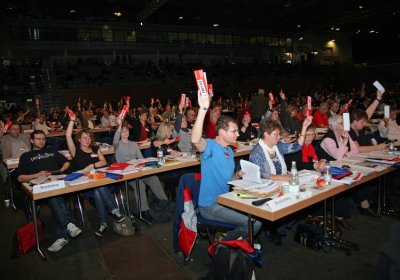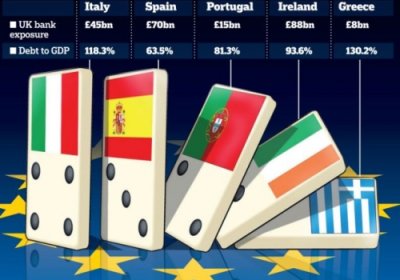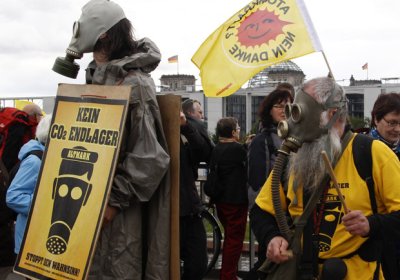Germany’s domestic spy agency, the Federal Office for the Protection of the Constitution (BfV), has been exposed for spying on left-wing MPs.
German magazine Der Spiegel said on January 23 that the BfV spied on MPs from Germany's biggest left-wing party, the socialist Die Linke ("The Left").
Der Spiegel said the intelligence agency had 27 of Die Linke's members in the Bundestag ― more than one third of its federal MPs ― and a further 11 members of state parliaments, under surveillance, costing 390,000 euros a year.
Germany
Late on October 23, the culminating vote of the program congress of the German Left Party (Die Linke) came in Erfurt’s cavernous Congress Centre: 503 delegates raised their voting cards to support the document as finally amended by the congress, with only four against and 12 abstentions.
Die Linke has operated since 2007 on the basis of the “programmatic key points” that created Die Linke from the fusion of the Party of Democratic Socialism (PDS) and the Electoral Alternative for Labour and Social Justice (WASG).
Elections in the city-state of Berlin on September 18 delivered another serious blow to the government of German Chancellor Angela Merkel, even as her party’s vote increased.
Merkel’s centre-right Christian Democratic Union (CDU) came in second place in the Berlin election, winning 23.4% of the vote – up from 21.3% in 2006.
Elections in the eastern German state of Mecklenburg-Western Pomerania on September 4 resulted in another humiliating defeat for the conservative government of German Chancellor Angela Merkel.
Merkel's centre-right Christian Democratic Union (CDU) had already suffered five election defeats this year.
The Mecklenburg-Western Pomerania defeat was particularly galling for Merkel because the state includes her own constituency.
The euro will survive for now — but only because working people in Greece and other European countries face greater suffering. That’s the not-so-hidden agenda behind the new US$227 billion bailout of Greece organised by the most powerful countries of the European Union, mainly France and Germany.
The German government announced on May 30 that Germany’s 17 nuclear power stations would all be permanently shut down by 2022.
Germany’s seven oldest nuclear power stations ― temporarily switched off after public outcry following the Fukushima disaster ― will remain off-line and be permanently decommissioned. An eighth was already off line, and will stay so.
Six of the remaining nine stations will be shut down in 2021 and the final three will be turned off in 2022.
May 22 elections in the German city-state of Bremen marked yet another disastrous result for the parties of Germany’s ruling coalition, the centre-right Christian Democratic Union (CDU) and the big-business Free Democrats (FDP).
Unsurprisingly, for the traditional working-class stronghold, the centre-left Social-Democratic Party (SPD) won 38.1% ― retaining government of the state in coalition with the Greens.
For the first time in history, the Greens leapfrogged German Chancellor Angela Merkel’s CDU to take second place, winning 23% of the vote – an increase of 6%.
The largest anti-nuclear protests in German history were held on March 26. About 250,000 people marched in Germany’s four largest cities.
Under the slogan “Fukushima Warns: Pull the Plug on all Nuclear Power Plants”, more than 120,000 took to the streets of Berlin, 50,000 in Hamburg, 40,000 in Koeln and upward of 40,000 marched in Muenchen.
In state elections held the next day, the German Greens won a historic victory in Baden-Wuerttemberg. They will form Germany’s first-ever Green-led government.
They also tripled their vote in elections in Rheinland-Pfalz.
German Chancellor Angela Merkel’s governing Christian Democratic Union (CDU) survived a narrow vote in elections for the eastern state of Saxony-Anhalt.
The right-wing CDU lost 3% of the vote from the previous elections, dropping to 32.6% support. The two other big parties in the state, the far left Die Linke and the centrist Social Democrats (SPD), remained steady on 23.8% and 21.5% respectively.
Merkel’s allies at a federal level — the pro-free market Free Democrats — failed to cross the 5% threshold needed to win a seat, as did the neo-Nazi National Democratic Party (NPD).
Facing public anger and concern over the nuclear meltdown unfolding in Japan, German Chancellor Angela Merkel announced temporary shutdown of several nuclear reactors.
On March 12, more than 60,000 anti-nuclear protesters in the south-western state of Baden-Wuerttemberg formed a 45 kilometre human chain from Stuttgart to the Neckarwestheim 1 nuclear plant.
Smaller protests took place in more than 450 towns and cities across Germany, anti-nuclear organisation Irradiated said. More protests are planned for March 26.
Germany’s centre-right government is facing what many have dubbed a “hot autumn” of protests, as conflict over a range of social, political and environmental issues come to a head across the country.
As the governments of Europe attempt to offload the costs of the financial crisis onto working people, German Chancellor Angela Merkel has initiated a series of “austerity” measures aimed to undermine Germany’s social welfare system.
More than 50,000 German anti-nuclear protesters defied 17,000 police over the weekend of November 6 and 7and blockaded a train carrying spent nuclear fuel rods from France to Germany.
On November 8, the fuel rods finally reached the small north German village of Dannenberg. From there, they were trucked a further 20 kilometres to an interim nuclear storage facility in the town of Gorleben.
Anti-nuclear activists drove more than 600 tractors, blockading roads and the railway in the largest ever demonstration over the transportation of spent nuclear fuel rods in Germany.
- Previous page
- Page 11
- Next page



